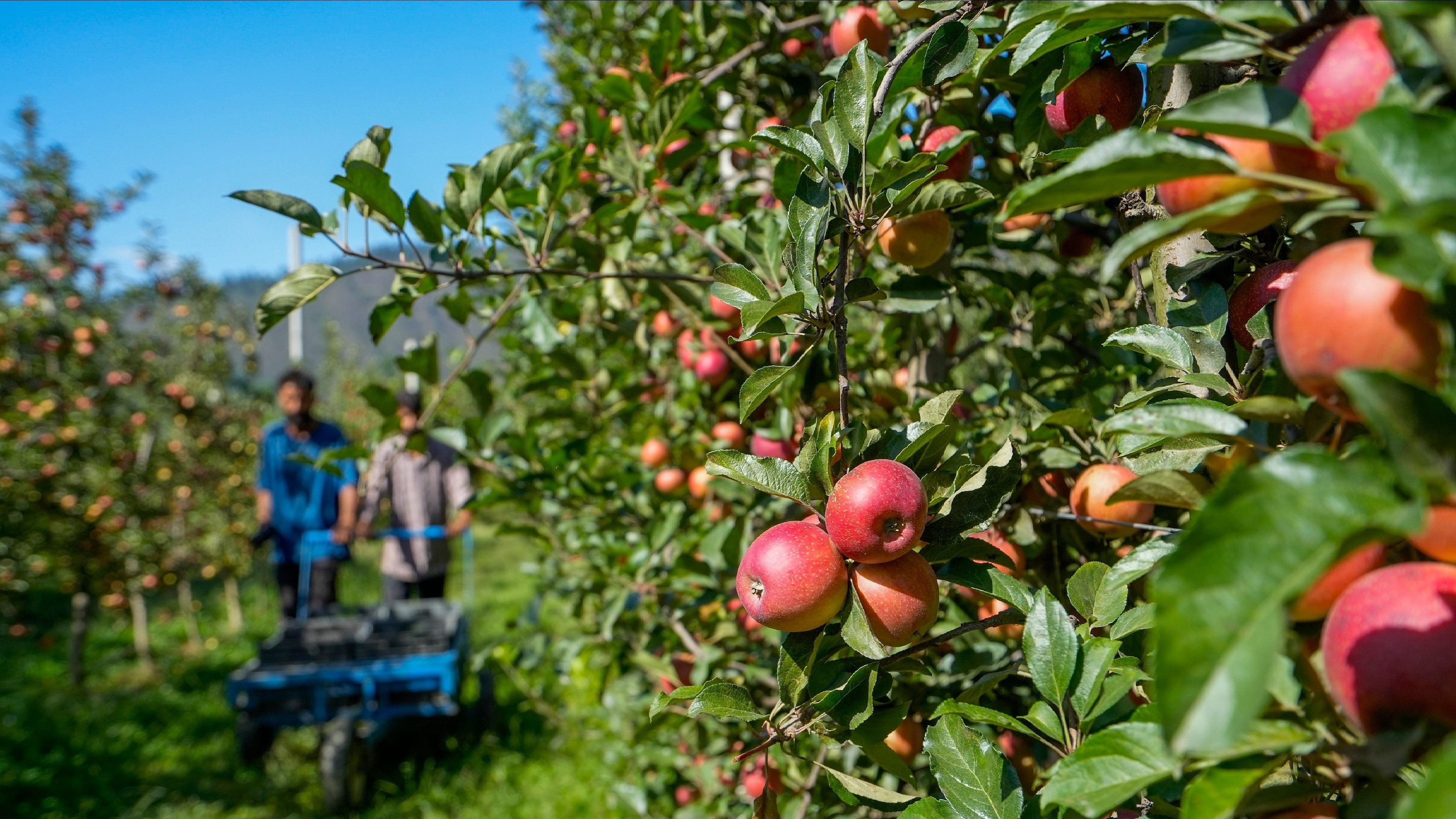
Gala Mast apples during its harvesting at an orchard, at Handwara in Kupwara district of North Kashmir.
Credit: PTI photo
We have all been taught that India is a country of villages and that we are an agriculture-dominant country. Somehow, in many cases, both statements are mixed to conclude that anything agricultural is rural. Another big misconception is that agriculture is all about farming.
There is no subject as wide as agriculture. However, most of our young population has not paid enough attention to the studies and career opportunities the subject offers.
Few state boards offer agriculture as a subject choice at the Plus Two level. Otherwise, professional study of the subject begins at the undergraduate level. Those who’ve studied physics, chemistry and biology may seek admission to the BSc-Agriculture (BSc-Ag), which lasts four years. Here, a candidate can choose a generic BSc (Ag) course or one from those dealing with specified branches. Agriculture as a science is divided into agronomy, dairying, sericulture, horticulture, fisheries, animal husbandry, and forestry. Specialisation may also be chosen at the post-graduation level. MSc can be pursued in any of the major branches of agriculture.
Agriculture can be studied as an engineering subject too. For this, Plus Two with physics, chemistry, and mathematics is a qualification. The specific areas of agricultural engineering include farm machinery, dairy engineering, soil mechanics, irrigation engineering etc. A BTech degree here can make you eligible for a number of jobs. However, doing MTech in agricultural engineering is a choice.
On the humanities side, economics has a branch known as agricultural economics. One may also be interested in environmental economics or development economics.
Another stream is related to medicine. Livestock has a major role to play in agriculture. Those qualified as Bachelor/Master of Veterinary Science (BVSc /MVSc) take care of animal health as their profession.
India has an extensive education network in every stream of agriculture. Government institutes dominate it. Almost every public university in the country has a master’s programme in agriculture. Undergraduate programmes can also be taken at university-affiliated colleges. There are exclusive agricultural universities spread over the country, which are particularly good for specialisations and super-specialisations.
In many cases, you will find science, management, economics and engineering courses on a single campus here. One example is the famous Dr Rajendra Prasad Central Agricultural University at Samastipur in Bihar. Established in 1970 as a state agricultural university, it offers undergraduate programmes in various branches of agriculture and MSc in agricultural biotechnology, plant physiology, horticulture, agricultural economics, agricultural statistics, entomology, plant breeding andgenetics, plant pathology, soil science, nematology; MTech in soil and water engineering, processing & food engineering, farm machinery and power engineering, MBA in agri-business, rural management, MFSc in aquaculture and fisheries resource management each. In Karnataka, there are agricultural universities in Bengaluru, Dharwad, Shimoga, etc.
Many universities, institutes, and research centres have been established to address specific domains under the affiliation of the Indian Council of Agricultural Research. There is a National Dairy Research Institute at Karnal, the Indian Institute of Horticultural Research at Bengaluru, and the Central Institute of Fisheries Technology at Kochi, to name a few. A complete list of 114 such entities is available on the Indian Council of Agricultural Research (ICAR) website.
At many of these institutes, research can be pursued for a doctoral degree, or a career as a research scientist can be taken. Agriculture offers ample research opportunities, both nationally and internationally. Indian Institute of Forest Management, Bhopal and Forest Research Institute in Dehradun are good places to study forestry.
A few IITs and many engineering colleges offer programmes in agricultural engineering. IIMs in Ahmedabad, Lucknow, and a few other places offer MBAs in agri-business management. The National Institute of Agricultural Extension Management, Hyderabad, also offers such courses.
The Institute of Rural Management, Anand, founded by Dr Verghese Kurien, is well-known for its postgraduate diploma in Rural Management. Cooperatives are very prevalent in agriculture. Those interested in this concept may join Vaikunth Mehta National Institute of Cooperative Management for their master’s programme.
Many universities offer agricultural economics as a specialisation or master’s degree. Gokhale Institute of Politics and Economics, Pune, offers an MSc (Agri-business Economics). At Indira Gandhi Institute of Development Research, Mumbai, and Dr B R Ambedkar School of Economics University, Bengaluru etc., agricultural economics is an elective.
With a degree in agriculture, you may look forward to joining the National Bank For Agriculture And Rural Development (NABARD) as a grade ‘A’ officer. Every year, the Institute of Banking Personnel Selection conducts recruitment exercises for agriculture field officers in participating banks. The Agriculture Scientists Recruitment Board advertises vacancies for scientists in central government bodies. Agricultural scientists are also required to work in food processing, fertiliser, pesticides, and chemical companies.
Corporate giants like Hindustan Unilever, ITC, Godrej, etc., need people qualified in agri-business and source them through campus selection and recruitment advertisements. Other prominent recruiters from the agriculture domain include Amul, IFFCO, TAFE, and Rallis India. Microfinance companies, consulting companies, and insurance companies have good opportunities. Working with an agri-startup can also be explored.